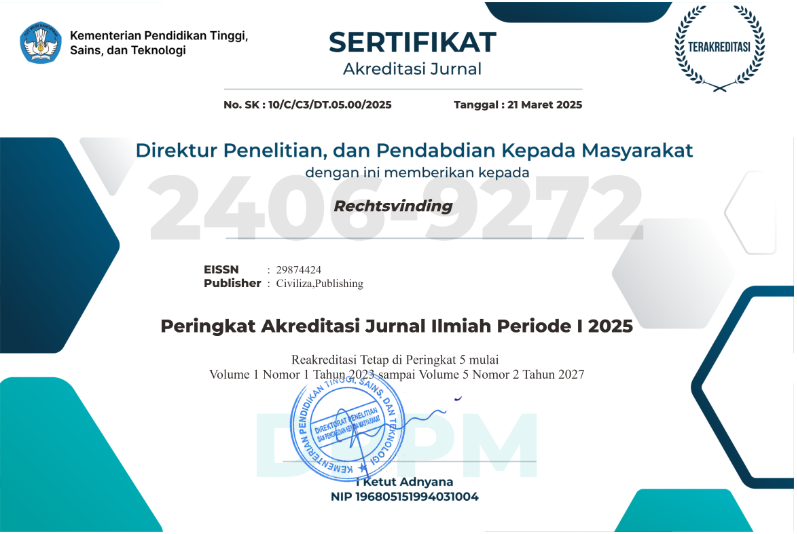Efforts to Overcome Poverty Through Integrated Education and Business Skills As a Form of National Defense
DOI:
https://doi.org/10.59525/rechtsvinding.v3i2.1075Keywords:
education; integrated; business skills; national defense efforts; povertyAbstract
Poverty in Indonesia, affecting almost a quarter of the total population, or approximately 23.85 million people, is a structural issue that has a reciprocal relationship with low educational quality, creating a vicious cycle that impedes national progress. This condition is exacerbated by educational disparities, as reflected in Indonesia's low global ranking, and the state's failure to realize the mandate of the 1945 Constitution of the Republic of Indonesia (UUD NRI 1945) to enlighten the nation through the effective allocation of 20% of the State Budget (APBN). The failure of the poor to acquire sufficient skills and critical thinking through education directly impacts national Human Resources (HR) quality and traps the country in the middle-income trap (mid-life crisis). This study aims to analyze the factors contributing to high poverty and low education, and to formulate policies that can integrate education and business skills as a fundamental effort in national defense (Bela Negara). This research employs the Normative Legal Research method using the statutory approach and the Conceptual Approach. The findings indicate that structural poverty and the state's failure to holistically implement the welfare state concept, including the inefficiency in allocating the 20% education budget, are the main factors perpetuating poverty. The proposed solution is an integrated policy that not only relies on social assistance and scholarships (KIP, KJMU) but also demands macro-economic reforms focused on inclusive growth and the development of education relevant to business skills as a permanent solution.
References
Agustanti, R. D., Dirkareshza, R., & Taupiqqurrahman, T. (2022). Peningkatan Pemahaman Dan Kewaspadaan Terkait Fenomena Kekerasan Seksual Terhadap Perempuan. JMM (Jurnal Masyarakat Mandiri), 6(4), 2684–2699.
Agustina, B. (2016). Kewenangan Pemerintah Dalam Perlindungan Hukum Pelayanan Kesehatan Tradisional Ditinjau Dari Undang-Undang Republik Indonesia Nomor 36 Tahun 2009 Tentang Kesehatan. Jurnal Wawasan Yuridika, 32(1), 82–98.
Alba, A. (2018). Kebijakan pemberian bantuan sosial bagi keluarga miskin. Asia-Pacific Journal Of Public Policy, 4(1), 72–89.
Alqorni, A., Siregar, F. W., Putro, P. S., Lubis, S. R., & Rafly, M. (2025). Advokat Sebagai Upaya Bantuan Hukum Dalam Penyelesaian Perkara. Journal Sains Student Research, 3(1), 445–457.
Arifin, J. (2020). Budaya kemiskinan dalam penanggulangan kemiskinan di Indonesia. Sosio Informa, 6(2), 114–132.
Bagus, R. C. S. D. Y. W. F. (2023). Buku Ajar Buku Ajar Hak Kekayaan Intelektual.
Barthes, P. J. D. D. R. (n.d.). Semiotika Dekonstruksi dan Post-Strukturalis Pemikiran Jacques Derrida Dan Roland Barthes.
Direktorat Jenderal Kekayaan Intelektual. (2019). Modul Kekayaan Intelektual: Bidang Desain Industri. 78.
Fahri, F. (2021). Daya Ikat Putusan Mahkamah Internasional: Analisis Penyerangan Militer dan Paramiliter Amerika Terhadap Nikaragua. The Digest: Journal of Jurisprudence and Legisprudence, 2(2), 263–283.
Fajar, M. B. (2023). KESETARAAN MENURUT BERBAGAI AGAMA: Perspektif Islam, Kristen, dan Hindu. AKADEMIK: Jurnal Mahasiswa Humanis, 3(3), 141–150.
Gandara, M. (2020). Kewenangan Atribusi, Delegasi dan Mandat. Khazanah Hukum, 2(3), 92–99. https://doi.org/https://doi.org/10.15575/kh.v2i3.8187
Ginting, B. (2022). Pemberdayaan Nelayan Tradisional: Analisis Kemiskinan Nelayan Tradisional Desa Percut. Jejak Pustaka.
Hanadi, S. (2019). Kewenangan Mahkamah Konstitusi dalam Menafsir Undang-Undang Dasar Negara Republik Indonesia Tahun 1945. Ekspose: Jurnal Penelitian Hukum Dan Pendidikan, 16(1), 349–360.
Indasyah, R. P., & others. (2023). Pola Koordinasi Dalam Pengawasan Penggunaan Dana Desa (Studi Kasus Desa Pancasila, Kecamatan Natar, Kabupaten Lampung Selatan).
Jumaida, F. F., & others. (2018). Pemenuhan Hak Intelektual Anak Terlantar (Studi Kasus Dinas Sosial Kota Banda Aceh). UIN Ar-Raniry Banda Aceh.
Junaidi, J. (2018). Korupsi, pertumbuhan ekonomi dan kemiskinan di Indonesia. 3(1), 71–79. https://doi.org/10.23917/reaksi.v3i1.5609
Junaidy, A. B. (2014). Harta Bersama dalam Hukum Islam di Indonesia. Al-Qanun, 17(2).
Kevin Priyatna, R. (2022). Penanaman Nilai-Nilai Pancasila Melalui Lakon Pewayangan Jawa di Desa Cinyawang Kecamatan Patimuan Kabupaten Cilacap. Fakultas Keguruan dan Ilmu Pendidikan.
Libra, R., & Fauzan, M. (2023). Penerapan Konsep Welfare State dalam Memprioritaskan Pelayanan dibidang Bantuan Hukum Bagi Masyarakat Miskin di Riau. Jurnal Esensi Hukum, 5(1), 39–49.
Marasaoly, S., Umra, S. I., & Pelupessy, A. (2025). Pemenuhan Hak Penyandang Disabilitas Dalam Memperoleh Pekerjaan Pada Instansi Pemerintah di Kota Ternate. Jurnal Interpretasi Hukum, 6(1), 40–51.
Marzuki, P. M. (2017). Penelitian Hukum: Edisi Revisi. Prenada Media.
Maziyah, D. S., & Nugraha, X. (2020). Komparasi Kewenangan Eksekutif Dalam Pembentukan Undang-Undang Pada Sistem Pemerintahan Presidensil: Antara Indonesia Dengan Amerika. Jurnal Selat, 8(1), 42–66.
Musak, R. A. (2019). Penegakan Hukum Hak Asasi Manusia (HAM) Atas Kejahatan Kemanusiaan Berdasarkan UU No. 26 Tahun 2000 Tentang Peradilan Hak Asasi Manusia Mengacu Kasus Pelanggaran Ham Wamena 4 April 2003. Lex Et Societatis, 7(6).
Nur Wardhani, P. S. (2018). Partisipasi Politik Pemilih Pemula dalam Pemilihan Umum. JUPIIS: JURNAL PENDIDIKAN ILMU-ILMU SOSIAL. https://doi.org/10.24114/jupiis.v10i1.8407
Portal Informasi Indonesia. (2022). Indonesia Poros Maritim Dunia. https://indonesia.go.id/narasi/ indonesia-dalam-angka/ekonomi/ indonesia-poros-maritim-dunia
Putra, B. M., Suri, E. W., Saputra, W. A., Manalu, E., & Banjarnahor, G. A. (2023). Kemiskinan Di Wilayah Pesisir Kota Bengkulu: Akar Masalah Dan Faktor Yang Mempengaruhinya. Mimbar: Jurnal Penelitian Sosial Dan Politik, 12(2), 230–258.
República del Perú. (2011). Ley N° 29792, Ley de Creación, Organización y Funciones del Ministerio de Desarrollo e Inclusión Social (Issue 29792). https://www.gob.pe/institucion/midis/normas-legales/270069-29792
Rizqi, M. I., Putri, C. F., Millatina, M., Abadi, M. T., & Aini, M. H. (2024). Analisis Perekonomian Empat Sektor: Dampak Ekspor Dan Impor Terhadap Pertumbuhan Ekonomi. Jurnal Ekonomi Bisnis Dan Manajemen, 2(1), 153–163.
Santoso, A., & others. (2013). Ketidakadilan, kesenjangan, dan ketimpangan: jalan panjang menuju pembangunan berkelanjutan pasca-2015. INSISTPress.
Sekretariat SDGs DKI Jakarta. (2023). Tujuan Pembangunan Berkelanjutan. Sekretariat SDGs DKI Jakarta. https://sdgs.jakarta.go.id/detil-sdgs/pekerjaan-layak-dan-pertumbuhan-ekonomi
Tedjo, P. (2018). Peran Demokrasi, Pilkada Serentak Tahun 2018 Tantangan Dan Harapan. Mimbar Administrasi FISIP UNTAG Semarang.
Zaini, A. (2018). Demokrasi: Pemerintah oleh Rakyat dan Mayoritas. Al-Ahkam. https://doi.org/10.37035/ajh.v14i2.1485
Zon, F., Iskandar, M., & Zuhdi, S. (2017). Tinjauan Sejarah Hukum Pasal 33 UUD 1945 sebagai Ideologi Ekonomi (The Legal History Review of Article 33 UUD 1945 as Economic Ideology). Negara Hukum: Membangun Hukum Untuk Keadilan Dan Kesejahteraan, 7(1), 111–125.
Downloads
Published
How to Cite
Issue
Section
License
Copyright (c) 2025 Rifdah Afifah, Slamet Tri Wahyudi

This work is licensed under a Creative Commons Attribution 4.0 International License.








